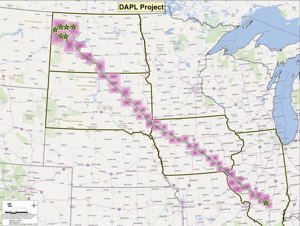Energy Transfer committed to building Dakota Access pipeline
(Reuters) Energy Transfer Partners, the company building a pipeline to transport oil from North Dakota to the US Gulf Coast said it remained committed to completing construction even after the US Justice Department blocked the project while protesters geared up for another day of demonstrations.
"We are committed to completing construction and safely operating the Dakota Access Pipeline within the confines of the law," Kelcy Warren, chairman and chief executive officer of Dallas-based Energy Transfer Partners, said in the letter to employees, which was provided to media.
The US Justice Department blocked construction along a 40-mile stretch in North Dakota, following the protests that have attracted numerous celebrities and politicians. The Obama administration decided to block construction on federal land shortly after a US District Court judge rejected a request from Native Americans for a court order to block the project.
The 1,100-mile, $3.7 B pipeline had been originally expected to start up later this year. But the Standing Rock Sioux, whose tribal lands are a half-mile south of the proposed route, have said the pipeline could pollute the tribe's drinking water and desecrate sacred burial and prayer sites.
Protests against the pipeline were planned for Tuesday from coast to coast. In more than 30 US states, demonstrators planned to gather for what activists dubbed on social media as a national "Day of Action" against the pipeline.
In what was likely to be the most closely watched protest, Vermont Senator Bernie Sanders was due to join a demonstration outside the White House in Washington.
Outside the US, activists said on social media they planned to hold protests in countries including Britain, Spain, South Korea and New Zealand.
The pipeline is nearly 60% complete, the company's letter said. Energy Transfer has spent $1.6 B so far on equipment, materials and workforce. When fully connected to existing lines, the line would be the first to carry crude oil from the Bakken shale directly to the US Gulf Coast.
"We intend to meet with officials in Washington to understand their position and reiterate our commitment to bring the Dakota Access Pipeline into operation," Warren added.
Protesters have said the pipeline could leak oil into the Missouri and Cannon Ball rivers, on which the tribe relies for water.
Reporting by Catherine Ngai; Editing by David Gregorio







Comments